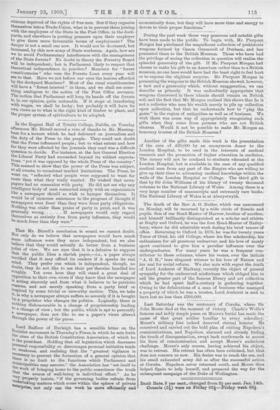In the Regent Hall of Trinity College, Dublin, on Tuesday
afternoon Mr. Birrell moved a vote of thanks to Mr. Massing- ham for a lecture which he had delivered on journalism and the duty of the Press to the people. They could not doubt that the Press influenced people; but to what extent and how far they were affected by the journals they read was a difficult question to decide. For instance, at the last General Election the Liberal Party had succeeded beyond its wildest expecta- tions, " yet it was opposed by the whole Press of the country." This seemed to show that the power of the Press was subject, at all events, to occasional marked limitations. The Press, he went on, "reflected what people were supposed to want far more than what they really wanted. He wished that news- papers had no connexion with party. He did not see why any Intelligent body of men connected simply with an organisation like a newspaper should so wish to hamper themselves. It would be of immense assistance to the progress of thought if newspapers were freer than they were from party obligations. Nothing was staler than praise of party in print, and it was generally wrong If newspapers would only regard themselves as entirely free from party influence, they would be much freer than they were."






































 Previous page
Previous page